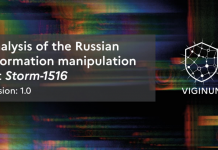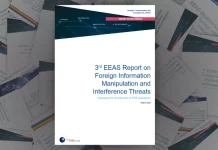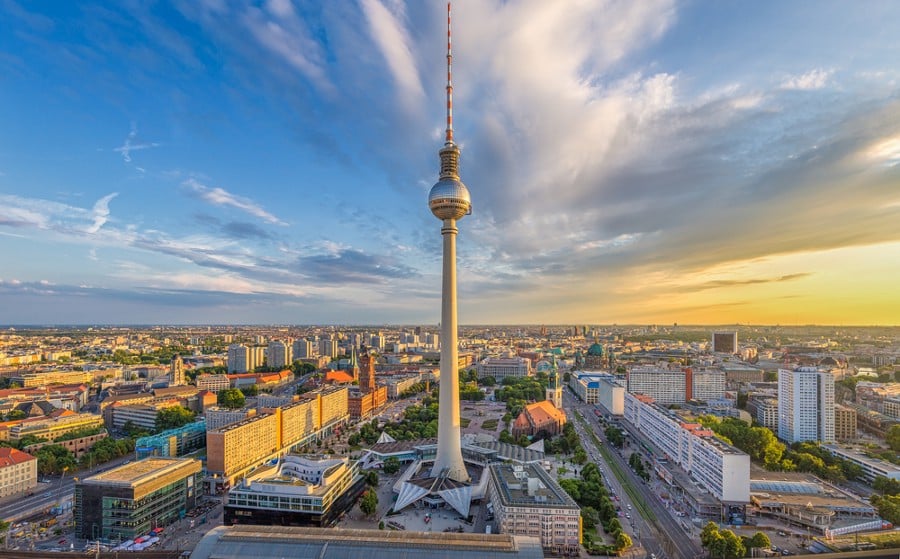
Contents
Preface
- Information as a Weapon
2. The Russian Media: Instrument to Influence Politics and Society Abroad
3. The Russian Media Network in Germany
3.1. RT Deutsch and Ruptly TV
3.2. Rossiya Segodnya and Sputnik Deutschland
3.3. Special Weapons: Trolls and the Internet Research Agency
4. Elements of the Disinformation Campaign
4.1. Distortion of Facts and Fake News
4.2. Countering Criticism by Counter-Criticism
4.3. Stigmatisation of Political Opponents
5. How Successful is the Campaign?
6. Conclusion
About the Author
Preface
The media is supposed to mirror political reality. At least this is the understanding and expectation in liberal and democratic societies. In autocratic societies, to the contrary, media create reality. They are part of a political machine to shape perceptions. The portrayal of political issues to the public is part of an overall process to indoctrinate the population and bring it in line behind the powers that be. In the Soviet era, this was called propaganda — a term that for the Communist Party was by no means derogatory. In fact, it had positive undercurrents. Was Soviet propaganda successful? Yes and no. It was able for decades to rally a good part of the Soviet population behind the lies of the politicians. But in the mid-1980s came Gorbachev’s glasnost’, and the spell was broken.
Despite this negative experience with propaganda that was unable to prevent the breakup of the Soviet system, the ‘new’ Russian, post-Soviet propaganda has revived the main features of the Soviet experience. It has adapted them using the possibilities of new technology and created once again a reasonably successful propaganda machine now rallying large parts of the Russian population behind the Putin regime.
Propaganda directed towards foreign countries and societies, especially in countries that do not share Soviet and Russian political values, has always been high on the list of the Kremlin’s priorities. As in the Soviet past, Russian propaganda in Western countries, including Germany, is more or less successful. This is partly due to the fact that Western users of Russian propaganda are often unaware of what they are consuming. They tend to perceive Russian propaganda the same way they read Western newspapers and listen to Western television and radio. They are unaware that Russian media do not reflect or comment on real events but are creating them. This may happen in a more or less sophisticated way or very crudely. In any case, the intention is clear: the user should perceive the world in clear-cut, black-and-white terms. Whatever Russia does is right, whoever criticizes Russia is wrong. Unlike in Western societies, the objective is not to establish the truth.
The intention of the present study is to draw readers’ attention to these facts; to enlighten them; to point out that the official Russian media cannot be read the same way one consumes ‘normal’ media; and that the propaganda is designed to advance the Kremlin’s interests in Germany. Another purpose is to demonstrate that Russian propaganda can be unmasked. Last but not least, propaganda is not all-powerful: remember the breakup of the Soviet system!
This report is based on Susanne Spahn’s project Russische Medien in Deutschland: Unabhängiger Journalismus oder politisches Instrument? [Russian Media in Germany: Independent Journalism or Political Instrument?] conducted under the auspices of the Friedrich Naumann Stiftung für die Freiheit and published in March 2018; in Russian: Российские медиа в Германии. Независимая журналистика или политический инструмент? For publication by the Institute for Statecraft it has been thoroughly revised and updated.
Gerhard Simon, University of Cologne, 8 March 2019
- Information as a Weapon
The media as the fourth estate in a democracy should inform the public about political, social and economic affairs and exert some degree of control over political leaders, but they have also been used time and again by rulers to maintain power. In Russia, the media play a central role in maintaining the authoritarian rule of president Vladimir Putin. This is true in particular for state-controlled television. Putin and his government dominate the news programmes and present themselves as effective and successful leaders.¹
Patriotic themes are an important part of the programmes, especially so after the annexation of Crimea, a move that contributed to Putin’s high approval rates of between 80 and 90 percent at the time (they have since fallen as economic woes at home hit ordinary people). Studies have shown that, fed mainly by nostalgia for the former Soviet Union, the majority of the Russian population expect such coverage. It also supports Putin’s initiative to spread a positive image of Russia abroad, including with the broadcasts of Russia Today (RT), the TV channel founded in 2005.²
In reporting events abroad, the channel is directed first and foremost against the United States and its global position. As Putin demanded, RT should be instrumental in breaking the ‘monopoly of the Anglo-Saxon media’.³
The International Information Agency Rossiya Segodnya, next to RT the second pillar of Russian foreign reporting, regards its objectives as quite similar. Dmitry Kiselev, its director general, is on record as having stated: “There are countries that impose their will on the West and the East. Wherever they interfere, blood is spilled, civil wars flare up, ‘colour revolutions’ start, and whole countries disintegrate: Iraq, Libya, Georgia, Ukraine and Syria”. People understand that one shouldn’t support the Americans in achieving their aims and that “Russia offers a model for the world in favour of humanity”,⁴ he said. Regardless of such bias, the Russian media abroad claim they want to promote “objective perceptions world-wide”. Shaping public opinion abroad for that purpose is one of Moscow’s goals in foreign policy, as authoritatively stated in Russia’s Foreign Policy Concept of February 2013.⁵
The Kremlin’s narrative, however, is blatantly at odds with wide-spread international perceptions and law. This is true in particular for the conflict over Ukraine. After the beginning of the Maidan demonstrations in Kiev at the end of November 2013, Russia’s media campaign abroad intensified. This was underscored by the decree Putin issued on 9 December 2013 for the more effective organisation of the state-controlled media.⁶ Another boost to the campaign was provided by the change of power in Kiev in February 2014. According to the secretary of the Russian Security Council, Nikolay Patrushev, the Maidan revolution was simply an illegal ‘coup’ supported by the United States.⁷ Other issues were Ukraine’s association with the EU and the country’s cooperation with NATO. In the eyes of the Russian leadership, the United States and its allies were pursuing policies aimed at detaching Ukraine and other post-Soviet states from Russia and subjugating the region to American influence, and to that extent, they were merely a continuation of the policies pursued by the West during the Cold War: Just as the United States then had wanted to destroy the Soviet Union, it was now aiming to cause the collapse of Russia.⁸
The Russian leadership’s information policy is part of its hybrid warfare. The strategies for the new phase of the information war have been on the tables of Russian policymakers at least since the beginning of 2013. In February of that year, chief of staff and deputy defence minister Valery Gerasimov spoke of the growing importance of non-military means, ‘which in a number of cases are much more effective than military means. They will be supplemented with covert military measures, including information countermeasures, activities of special operations forces, and the exploitation of the population’s protest potential’, he stated.⁹ Such assessments are shared by leading media officials, who claim that they are caught up in an information war. Margarita Simonyan, editor-in-chief of RT, even asserted that her organization was really a “defence ministry” and “a weapon like any other”.¹⁰
2. The Russian Media: Instrument to Influence Politics and Society Abroad
Putin has declared media work abroad to be a top priority. His decree of 9 December 2013 demanded greater effectiveness of the Russian state media, and in response, the news agency RIA Novosti, the largest and most modern Russian news agency, was merged with the foreign broadcasting system Golos Rossii (Voice of Russia) to form the International Information Agency Rossiya Segodnya (Russia Today). According to the decree, the task of this new agency is to disseminate information abroad about the state policy of the Russian Federation and Russian social life.¹¹ The new media group was included in the List of Strategic Companies of Russia, that is, enterprises that are considered to have special significance for the defence capability and security of the country.¹²
In November 2014 Rossiya Segodnya launched a worldwide media project called Sputnik International. Its director general Dmitry Kiselev is also presenter of the weekly News of the Week on the state television channel Rossiya 1. He provided media support for the annexation of the Crimea and routinely questions the sovereignty of Ukraine. Rossiya Segodnya planned to broadcast to 130 cities in 34 countries and 30 languages by 2015. The correspondent network of Rossiya Segodnya in 2014 included 40 representative offices worldwide. Judging by the plans of Sputnik International, Rossiya Segodnya would have to at least triple its number of bureaux. Whether the goal has been achieved is unclear. The Sputnik website only stated that the agency was present “in dozens of world capitals”.¹³
At the end of 2014, RT had 22 offices in 19 countries, and this number does not appear to have changed since then.¹⁴ According to the market research company Ipsos, in 2016, 70 million people worldwide watched RT once a week, including 36 million in Europe. RT, therefore, would have almost the same coverage of BBC World Service, with 76 viewers a week worldwide, and be one of the five biggest international broadcasting systems.¹⁵ Contrary to wide-spread assumptions, RT does not belong to the Rossija Segodnya agency but is run by state-funded TV-Novosti.¹⁶ RT plays the most important role in Russia’s broadcasts abroad. This is shown by the volume of its funding (see Graph 1). At the beginning of 2015, however, it appeared doubtful whether the global media campaign could be carried out as planned. As a result of the depreciation of the rouble, the budgets of RT and Rossiya Segodnya for that year were cut to the then equivalent of 301 million Euros, which is a reduction of about one third.¹⁷ The Russian leadership reinstated the money that had been cut, bringing the total allocation to about 340 million euros (23.6 billion roubles) for the year 2016.¹⁸
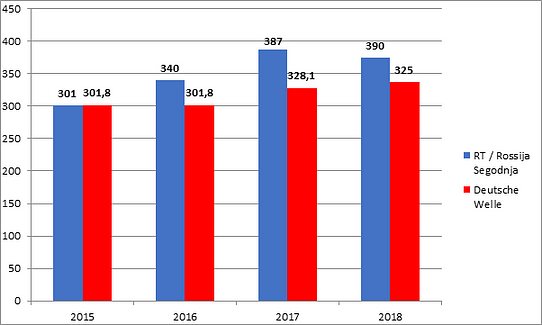
With a view toward the 2017 presidential election in France, the Duma approved an additional 20 million euros for RT — ‘for victory in France’, as the Russian media explained. Undeterred by the fact that victory (for right-wing presidential contender Marine Le Pen) could not be achieved, on 18 December 2017 RT began broadcasting in French. In total, allocations to RT for 2017 amounted to 292 million euros (18.74 billion roubles).¹⁹ On the other hand, Rossiya Segodnya had to accept a small reduction in its funding, receiving ‘only’ 94 million euros (6 billion roubles).²⁰ The Russian government considered its media campaigns to be important enough to allocate to them a total sum of 387 million euros (24.74 billion roubles) in 2017. That is more than the budget of Deutsche Welle, with 328 million euros.²¹ In 2018, Russian financial allocations increased to a record high of 390 million euros (26 billion roubles).²² Due to the depreciation of the rouble, later in the year the euro equivalent of the funding decreased to 343 million euros (exchange rate of 29 November 2018). Deutsche Welle also received more money but still, with a total of 325 million euros, much less than its Russian counterparts.²³
3. The Russian Media Network in Germany
It is not only the United States that is in the focus of Russia’s information war but also its NATO alliance partners. Correspondingly, the Russian leadership is looking for support in European countries for its narrative. In doing so, it wants to drive wedges into the alliance, notably between the United States and Europe, and to isolate those members of NATO and the EU, like Poland and the Baltic states, that are most critical of Russia.²⁴ The main objective of the constant criticism of NATO and the EU in the Russian foreign media is evidently to undercut the legitimacy of these organizations in the eyes of the public. In the process, the media are latching on to already existing scepticism and reservations about the United States and the EU and reinforcing and replaying them. Currently, the media coverage massively exaggerates the refugee issue in Europe in an effort to divide society. That applies particularly to Germany. For reasons of its economic power and political influence under chancellor Angela Merkel, the country is a major focus of the Russian foreign media offensive. Its goal in this context is to erode the German public’s confidence in the German media. They are attacked as hiding the truth — hence the title of a ‘news’ programme called ‘Der fehlende Part’ (The Missing Part) broadcast on the website of RT Deutsch.
RT Deutsch entered the German media market in November 2014, initially with a web portal. The creation of a TV channel was to follow in 2015 but this has not happened yet. RT Deutsch claims to offer an ‘alternative source of information outside the mainstream’ and that its goal ‘is to create a public opposition and to reveal media manipulation.²⁵ Similarly, Sputnik Deutschland asserts that ‘Sputnik reports on what others are silent about.’²⁶ Such claims are made despite the admission of both the chief of Rossiya Segodnya and the editor-in-chief of RT Deutsch that their programmes are financed by the Russian government.²⁷
3.1. RT Deutsch and Ruptly TV
When RT Deutsch started its service, it was based in Berlin, Lennéstraße 1, near Potsdamer Platz, but since then it has moved to a studio in Berlin-Adlershof.²⁸ Editor-in-chief Rodionov is a much sought-after interviewee in the German media. Prior to the foundation of Ruptly in 2013 (see below), he was executive editor of the Berlin office of RT and office manager of the Russian television station RTR in Germany. He also worked for international clients such as ZDF, TVS Moscow and Worldwide Television Agency.²⁹
RT Deutsch appears to prefer to hire young people. Jasmin Kosubek, the presenter of Der fehlende Part, for instance, studied business administration and RT was her first job.³⁰ Its staff consists of 30 full-time journalists and technicians; for the most part, however, the former do not have any professional training, as revealed by undercover research conducted by a German television channel.³¹
Officially, the editors of RT Deutsch assert that their reports are not biased and not subject to influence or interference by the Russian government. In various interviews, however, some of its journalists have openly admitted that they conform to the editorial line of Russian state television.³²
The video agency Ruptly TV, a subsidiary of the channel RT with 25 offices worldwide, began operating in April 2013. Like RT Deutsch initially, it is located in Berlin in Lennéstraße 1. Its office in Berlin employs around 110 people, who are from Britain, Spain, Russia and Poland.³³ Its first editor-in-chief was Ivan Rodionov, followed in April 2015 by Ksenia Fedorova, and at present that position is held by Dinara Toktosunova.³⁴ Furthermore, at the beginning of 2018, Ruptly TV established two subsidiaries in Berlin that are active in the social media realm, Redfish GmbH and Maffick Media GmbH. The former features videos under the name of Redfish and the latter is online under the headings of In the Now, Backthen and Wasted, all of which can be watched on Facebook, Instagram and Youtube.³⁵
Whereas Ruptly TV and RT Deutsch give plenty of space to right-wing populist messages of the AfD, Pegida and other right-wing and populist groups, the social media sites Redfish and In the Now target a more left-leaning and apolitical audience. Redfish focuses on issues critical to society, portrays itself as a ‘platform for the people’ and ‘swimming against the current’, and, like its parent organization Ruptly and RT Deutsch, claims to provide an alternative to the German ‘mainstream’ media.³⁶
The channel In the Now, which is operated by Maffick Media, primarily shows non-political and emotionally charged videos that have a high entertainment value. Kremlin narratives are mixed in fairly inconspicuously. The EU’s analytical unit EU vs Disinfo describes RT’s recipe for reaching a young and international audience as follows: ‘Start an online project called In the Now; get English native speaking hosts; develop content with high entertainment value; and spice up with content providing “the Russian perspective”’.³⁷
In autumn 2018 Maffick Media went online with the channels Backthen and Waste-Ed. Backthen, under the slogan of ‘Unheard history. Unsung heroes, Under-covered underdogs’, claims to highlight hitherto unknown or underreported issues of history.³⁸ Waste-Ed directs its appeal to an ecologically conscious audience and denounces pollution of the environment.³⁹
3.2. Rossiya Segodnya and Sputnik Deutschland
At the end of 2013, the news agency RIA Novosti and the Russian radio station Stimme Russlands (Voice of Russia) merged to form Rossiya Segodnya. The two organizations had operated services in German for quite some time. RIA Novosti, which had provided services in German since 2001, changed its name to Sputniknews at the end of 2014. Stimme Russlands, the predecessor of which⁴⁰ After the dissolution of the Soviet Union, the state station operated as Stimme Russlands; after the foundation of Rossiya Segodnya, the name was changed to Radio Sputnik; in December 2014, it was renamed SNA Radio, the abbreviation standing for Sputnik News Agency;⁴¹ at present, SNA Radio can also be accessed on the website of Sputnik Deutschland.⁴² The face of the RIA Novosti agency in Germany from 2000 to 2014, in his capacity as head of the agency’s Berlin office, was Dmitry Tulchinskiy.⁴³ Since then, the position of the director of Rossiya Segodnya’s office in Berlin has been held by Andrey Ivanovskiy, previously head of the German service of RIA Novosti and Moscow representative of the Austrian magazine Profil.⁴⁴
Twelve radio journalists of the former Stimme Russlands are employed in the Berlin editorial office of Sputnik, Ivanovskiy said in an interview.⁴⁵ He also revealed that material for the website is supplied directly by Moscow, where an editorial staff of about 20 journalists writes only for the website Sputnik Deutschland. Ivanovskiy explained further that the most important topics generally to be addressed are agreed upon at an editorial conference in Moscow and that the conference formulates proposals for the Berlin office. ‘At least 90 percent of content on the German Sputnik web site originates in Moscow’, he stated. ‘Sputnik Deutschland is putting online approximately 80 contributions per day, including audio features and photos with a special focus in Berlin directed to radio contributions’.⁴⁶ Ivanovskiy thereby clarified that Moscow not only provides financing but also decides the major portion of editorial content. (Sputnik Deutschland claims that its journalists are free to choose the subjects they want to cover and would at most be alerted to professional mistakes.⁴⁷) According to Ivanovskiy, the relationship between his organisation and RT Deutsch is one of competition.
3.3. Special Weapons: Trolls and the Internet Research Agency
The online portals of German media are increasingly confronted with a flood of comments, so-called ‘shitstorms’. For example, Ingo Mannteufel, head of the Russia editorial board of Deutsche Welle, explains: ‘These are in part raw insults of German politicians and of the chancellor in particular, often having anti-Semitic and anti-American undertones. They try to discredit our news coverage, claiming that we are one-sided and do not report on events objectively.’ The identities of the commentators are uncertain and their Facebook profiles do not appear to be genuine.⁴⁸
Given the uncertain identity of these internet activists, the term ‘trolls’ has gained wide currency. As it turned out, many of them are on payrolls. The most prominent examples are the employees of the Internet Research Agency in St. Petersburg, who target domestic as well as foreign audiences. The agency was officially registered in 2013 but probably began its activities earlier. In March 2014, it was re-registered as a limited liability company under the name of ‘Internet Research’ (Internet issledovaniya) located in Savushkin Street 55 in St. Petersburg. Its director-general is Mikhail Bystrov, a former police colonel and former head of the Department of the Interior Ministry for the Moscow district of St. Petersburg.⁴⁹ The most important findings about the St. Petersburg ‘troll factory’ come from the Russian newspapers Moy rayon and Novaya gazeta due to the fact that employees themselves conducted research into the agency. Additional information was provided by internal papers from the agency intercepted by hackers from the Anonymous International group.
In March 2015, the Petersburg newspaper Moy rayon managed to provide information about the working methods of the trolls, revealing that there were about 400 employees working there.⁵⁰ The budget in 2015 was reported to amount to the equivalent of about 250,000 euros per month. According to a video showing the inner workings of the agency and interviews with former employees, the agency is ruled by strict discipline. The employees make sure that they arrive for work on time because being late and other misconduct will be punished with salary deductions. A favorable attitude toward the government is one of the main requirements for employment is, rather than qualifications for the job, the newspaper reported.⁵¹ All employees must sign a confidentiality agreement and are monitored by camera.⁵² The daily work load is about 150 government-friendly comments, according to former employee Marat Burkhard, who earned about 600 euros a month. English-speaking employees would get more than 1,000 euros.⁵³
So-called ‘technical information’ on the selection of topics also became public. Lists outlining a precise sequence of topics were distributed to the employees. For example, for 28 February 2015, these were for one group of employees (1) opposition to the government, (2) the EU, (3) Ukraine, (4) the defence ministry and (5) the rouble rate; another group was to focus on the issues of opposition, the US and Ukraine; and yet a third had to post content about Putin, Ukraine and the opposition.⁵⁴ In addition, there were precise instructions on how the contributions were to be designed. For example, on the topic of ‘opposition’ the murder of the opposition politician Boris Nemtsov was to be portrayed as a provocation. Two versions were to be used: one that Ukrainian oligarchs had ordered the murder; the other that it was the opposition itself. The objective of both instigators of the ‘provocation’ being to bring out the people into the streets to protest against the government. As an example of how to use the material, the trolls were provided with a report by RIA Novosti.⁵⁵ Work at the agency is conducted in two shifts of twelve hours each. There are several units. One comments on news, another deals with cartoons and a third is devoted to blogging.⁵⁶
In the summer of 2015, activist Ludmila Savchuk from St. Petersburg pulled the secret troll factory into the limelight. She sued the agency for violating Russian labour laws as she was not officially employed and her salary was undeclared.⁵⁷ Savchuk had previously handed over a video and ‘technical instructions’ of the agency to the reporter of Moy rayon, who published them.⁵⁸ The court ruled that the agency had to pay damages to the plaintiff − a symbolic one rouble.⁵⁹ When a New York Times reporter visited the business center on Savushkin Street in early summer 2015, the agency was no longer at that location. It is unclear whether the agency still exists under this name, whether it has moved elsewhere or whether some other news agency has been given its tasks.⁶⁰
The platform Twitter provided insights into the activities of the Internet Research agency, publishing the archive of about ten million tweets. The majority of the 5,000 accounts were from Russia.⁶¹ The trolls became active above all when polarisation in the public domain was on the increase, as, for instance, in the period leading up to the 2017 German parliamentary election. Correspondingly, the most frequent postings were #Merkel and #Flüchtlinge (refugees). As will be shown in the next chapter, the trolls thereby lent their support to the campaign against the CDU and chancellor Angela Merkel.
4. Elements of the Disinformation Campaign
4.1. Distortion of Facts and Fake News
The Ukraine conflict is a particularly good example of selective usage of facts and misrepresentation as a means of influencing public opinion. In the media coverage, the facts of Russia’s violation of international law by annexing Crimea and its military intervention in eastern Ukraine are denied and the essence of the conflict is turned upside down, with Russia rather than Ukraine appearing as the victim. NATO is painted as a threat, one of the purposes of its enlargement towards the east allegedly being the stationing of missiles in Ukraine. The change of power in Kiev in February 2014 is described as a US-backed coup that is claimed to have brought to power fascists and radical nationalists. Putin supports such images. For instance, in an interview German television he charged that ‘There are people with swastikas on their sleeves. On the helmets of the combat units fighting in the east of Ukraine, we see SS symbols.’⁶²
The Russian media weakened their ‘fascism’ assertions after it turned out in the 2014 presidential and parliamentary elections that the electoral strength and representation of the nationalists were marginal. While the Maidan is still being painted as a nationalist coup, the emphasis now is on portraying Ukraine as a failed state, in which corruption, misery and chaos prevail. At the same time it is suggested that this is not a real state, but an artificial construct. Thus, Sputnik News has reported: ‘According to political scientist Andrey Kozhkin of the Russian Plekhanov University of Economics, today’s Ukrainian leadership was established by the European states. […] “Furthermore, the nationalism that is cultivated today in Ukraine is dangerous not only for the Donbas but also for Poland and the states of the old Europe”, the political scientist continued. […] This is an unprecedented situation for modern Europe because in the history of the continent until now such a “non-viable structure” never existed.’⁶³
In addition, reports on Ukraine are manipulated or deliberately misrepresented. One example is the coverage of Russia’s military activities in eastern Ukraine. With one notable exception by Putin himself, the use of Russian military in eastern Ukraine has been officially denied.⁶⁴ This was the case, for instance, with the presence of a Russian military convoy in Ukraine evidenced by NATO with footage in November 2014. RT Deutsch posted a report with the suggestive title of ‘New NATO Game in Ukraine: I see something you do not see.’ It stated: ‘According to the NATO commanding officer in Europe, Philip Breedlove, a transfer of Russian military hardware to eastern Ukraine has been observed in recent days. The UN and Russia have denied the accusation. […] But what NATO and the OSCE are confirming (bestätigen), the UN cannot. UN spokeswoman Stephane Dujarric said on Friday that a transfer of Russian troops by the UN can not be confirmed. The Ministry of Defence in Moscow has also rejected NATO’s allegation that the Russian military has intervened in Ukraine.’⁶⁵
The assertion that the UN could not confirm the report on Russian troop deployments is a misrepresentation. In the briefing by UN spokesman Stephane Dujarric on 7 November 2014 the question was raised as to whether the UN could independently ‘verify’ NATO reports on troop deployments. Dujarric’s answer was: ‘On the troop movement, no, we’re not, at this point, here, able to verify it.’ In this context, ‘verify’ should be translated as überprüfen or verifizieren, not as bestätigen. Essentially, the spokeswoman had said the UN could neither confirm nor deny the report.⁶⁶
Another example of misrepresentation is a report by Sputniknews about Amnesty International’s criticism of the blockade of Russian aid convoys for eastern Ukraine.⁶⁷ The report was illustrated with a picture of trucks bearing the inscription ‘Humanitarian Aid from the Russian Federation’. The aid deliveries that were stopped by Ukrainian militias, however, were actually carried by trucks of the Ukrainian billionaire Rinat Akhmetov’s foundation. Evidence for this was provided by a press release from Amnesty International showing the trucks actually affected.⁶⁸ The Sputnik report highlights Russia’s alleged readiness to help. Although Akhmetov is later mentioned in the text, this is not the case in the opening credits. Thus, the impression is being conveyed that the help came from Russia.
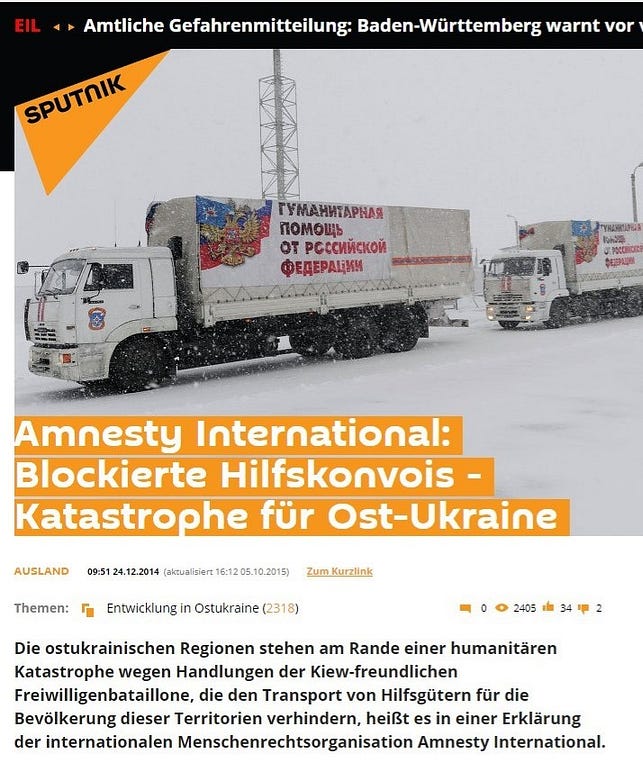
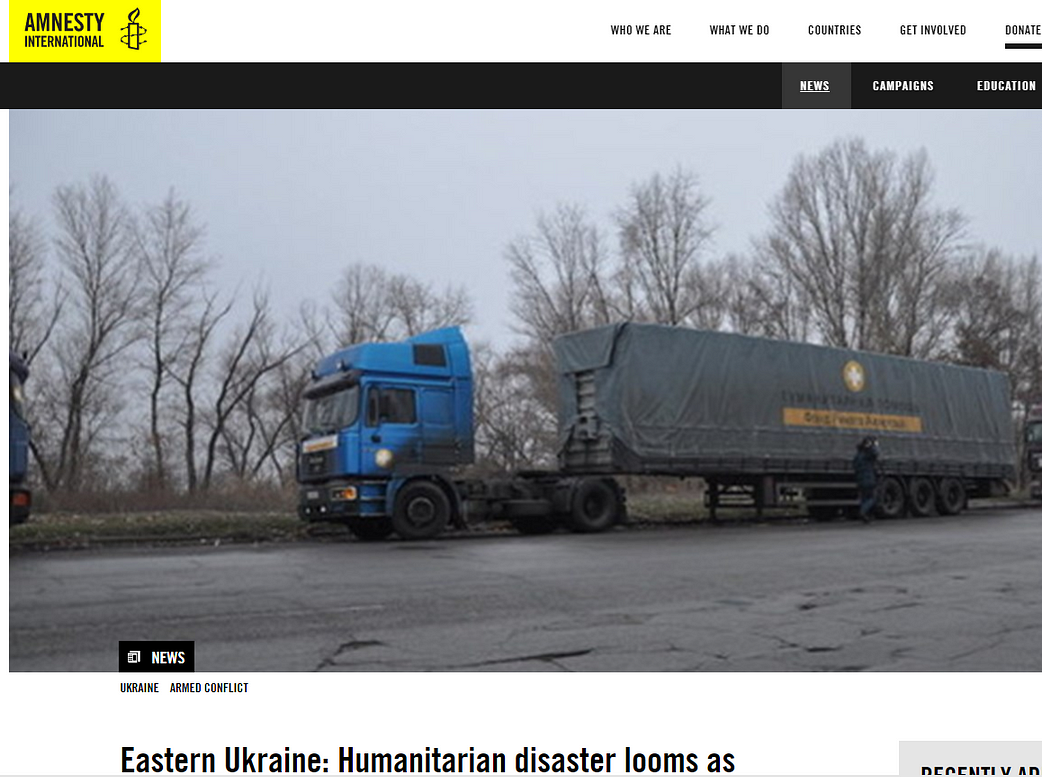
The photo above shows the trucks of the Ukrainian oligarch Rinat Akhmetov.
4.2. Countering Criticism with Counter-Criticism
Another common strategy of Russian media to counter criticism of the Putin system and its policies is to engage in counter-criticism, thereby weakening the charges. This is an approach often referred to as ‘whataboutism’, a term referring to the question of ‘But what about …?’ This political propaganda tool has a long tradition dating back to the Soviet Union. When the West criticised the human rights situation and the gulags, Soviet propaganda hit back, claiming that ‘In America, they lynch blacks.’⁶⁹ Whoever uses such arguments evidently does not want to engage in fair discussion but divert attention from the subject matter. This also has the apparent advantage that the carrier of the message can portray himself as a critical thinker.
An example of whataboutism are RT Deutsch’s claims that the German ‘system media’ spread fake news to discredit ‘alternative’ media such as itself — an assertion made in reaction to charges that the Russian site is spreading fake news. Editor-in-chief Rodionov attempted to demonstrate this in reference to the case of ‘Our Lisa’.⁷⁰ The case involved a 13-year-old girl of Russian-German ethnic background who in January 2016 was allegedly abducted in her parents’ home in Berlin-Marzahn and raped. The allegations turned out to be unfounded: the girl had spent the night with a friend with whom she had a sexual relationship. Russian media nevertheless accused the German authorities of attempting to cover up the case. Even foreign minister Sergey Lavrov criticized the investigation until to do so became untenable in the light of the facts.⁷¹
In the heading of one of its articles dealing with the case, RT Deutsch claimed that the Lisa case was ‘The Most Persistent Fake News about RT Deutsch’. It then read: ‘Propaganda is like bad breath: Only others have it. Whether to call it “fake news” or “the post-fact era”, the journalists of the mainstream media currently don’t leave out any keyword to defend their monopoly over interpretive sovereignty. However, their favorite example against RT Deutsch, the Lisa case, turns out to be a fake.’ This was followed by an editorial by Rodionov claiming that in that case RT Deutsch had always served the public in the interest of establishing the truth. He concluded that ‘German alpha journalists are incapable of conducting even rudimentary research’ or perhaps, even though he would not like to believe it about his German colleagues, ‘comatose’.⁷²
Contrary to Rodionov’s claim, the reports by RT Deutsch on the Lisa case are a clear example of whataboutism. RT Deutsch, as per moderator Maria Janssen in the programme Der fehlende Part (The Missing Part) of 28 January 2016, accused the German ‘mainstream media’ of having artificially blown up the case and whipped up resentment against migrants: ‘The case of the possible mistreatment and of the proven sexual abuse of 13-year-old Lisa from Marzahn’, she claimed, ‘has encouraged both ultra-nationalists and Russophobe mainstream media to exploit for political purposes the fate of a girl in a shameless manner.⁷³ This charge was followed up by an interview with the lawyer hired by Lisa’s family, Alexey Danckwardt, in which he criticized the police and called her statements to be truthful. ‘There was a crime. […] It is clear that there was sexual abuse.’ The girl had suffered personal injuries. ‘At least this has to be treated as sexual abuse of a child’. Whether she was raped still had to be established.⁷⁴
The Berlin correspondent of the Russian state television First Channel, Ivan Blagoy, who had got the case rolling, also attacked the German media. They had embarked on a ‘massive hate campaign’ against the family, something that could only be called disgusting. ‘A misfortune has befallen her family’. They were shocked not to have received any compassion. He repeatedly linked the case to the treatment of migrants in Germany, speaking of socially important issues that are of particular interest after the incidents in Cologne’.⁷⁵
Again to be noted here is yet another example of the whataboutism strategy as part of the Russian information warfare, seeking in this instance to distract attention from allegations that the Russian media had not objectively reported the Lisa case and attempted to whip up anti-immigrant sentiment in Germany. In fact, RT Deutsch did not at all endeavor to clarify the facts, as Rodionov repeatedly asserted, but by frequently using words such as ‘crime’, ‘misfortune’ and ‘sexual abuse’ made it appear as if the allegations that the girl was abducted and raped by migrants were true.
In February 2017, the Berlin prosecutor’s office brought charges against a suspect involving sex with a minor. The allegations of the girl about kidnapping and rape were dismissed.⁷⁶ RT Deutsch nevertheless saw itself confirmed in its coverage and again made serious allegations against the German media, asserting that it had conducted a ‘hate campaign against Russia’. It said: ‘“There was nothing” and the Russians are to blame. BILD [Zeitung] early on knew how to exploit the case of the abused girl for inciting hate against Russia. […] They spoke of alleged Russian disinformation and ‘destabilisation intentions’. In reference to the Lisa case, even an investigation of Russian media by the German intelligence services was legitimized, which only recently ended, yet without any result. For the [now] 14-year-old Lisa, one would certainly have wished that the German mainstream media would finally end their campaign of instrumentalising the case. For over a year, they have used the name of the abused girl to stir up negative sentiments against Russia. This is another trauma inflicted on the victim.’⁷⁷
Thus, RT Deutsch considers its coverage of the Lisa case to have been confirmed. However, sex with a minor, on the one hand, and abduction and rape, on the other, are two different offences, and these were merged in RT Deutsch’s report. The German media nevertheless stood accused of having wanted to cover up the case and launch a ‘hate campaign’ against Russia. The Russian media, like RT Deutsch, thereby sought to distract attention from the accusation that they were using the Lisa case to stir up sentiment against migrants.
4.3. Stigmatisation of Political Opponents: Reporting on Chancellor Merkel
Chancellor Angela Merkel is in the focus of Russian media coverage in Germany above all because of her support for sanctions against Russia as a result of the annexation of Crimea. Since the beginning of 2017, a whole series of reports have been published to discredit Merkel as a person and her policies. The line to be taken was presented by Rossiya Segodnya director Dmitry Kiselyev in his Sunday program ‘News of the Week’ on the Rossiya 1 channel. He said that ‘I am far from touching on the most sensitive topic for women here, their wrinkles or their hairstyle, or the permanent measure of their pantsuit. I just have the feeling that Merkel has gone out of style. As they say in French: she is démodée. […] When one analyses Merkel’s activities more deeply, one can easily recognise a thesis, an old one for Germany, namely about a lack of Lebensraum [space in which to live]. We painfully had to suffer the consequences of this, through Hitler. […] But in the Merkel era, completely in line with the old concepts of Mitteleuropa [Central Europe] and Lebensraum, Germany literally wanted to swallow Ukraine.’⁷⁸
Such assertions were repeated by RT Deutsch and Sputniknews. This can be seen, for example, in a report by RT Deutsch with a photo in which demonstrators greet Merkel with ‘Heil Merkel’ (see Screenshot 3). In the explanation accompanying the article, it says: ‘In Halle, Sachsen Anhalt, in a parade for the “Mother of all Germans”, demonstrators protested against the policies of the acting chancellor Angela Merkel. The demonstrators put up a red banner with the writing “Heil Merkel” and called out the very same slogan. The rally was held on the occasion of Merkel’s appearance at the Leopoldina Academy of Sciences in Halle (Saale).’⁷⁹

In the run-up to the parliamentary elections in September 2017, the Russian media positioned themselves unambiguously. This was shown by research carried out by the London Institute for Strategic Dialogue and the Arena Institute of Global Affairs at the University of London’s School of Economics with the aid of computer-based textual analysis (see the following two graphs).⁸¹ The statistical evaluation of Sputnik and RT reports published between 2 and 10 September shows that the right-wing party Alternative für Deutschland (AfD) and the leftist Die Linke were the only parties to be positively rated. The coverage of chancellor Merkel and the German government was overwhelmingly negative.
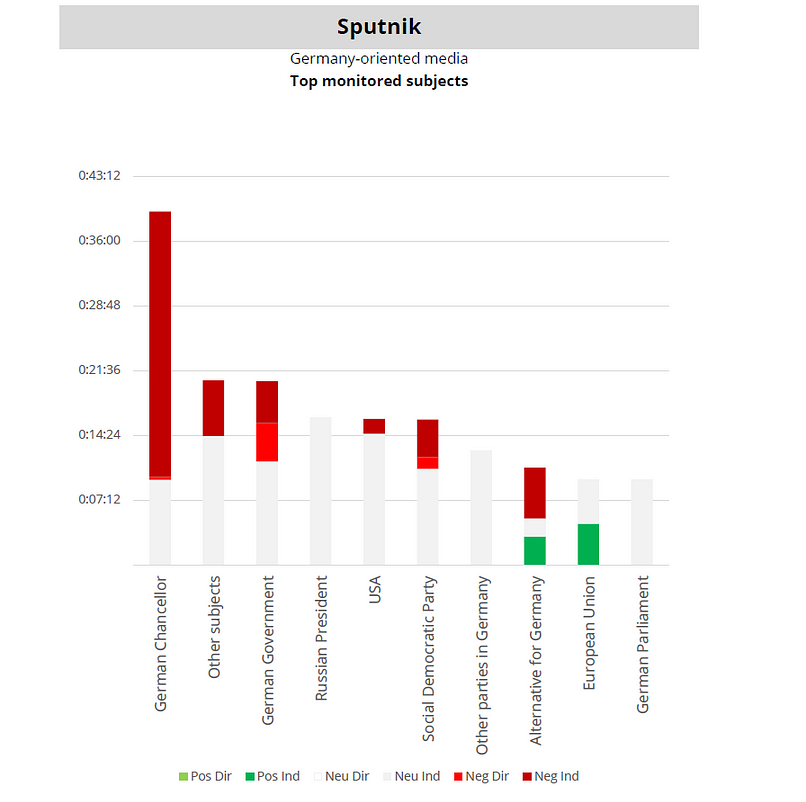
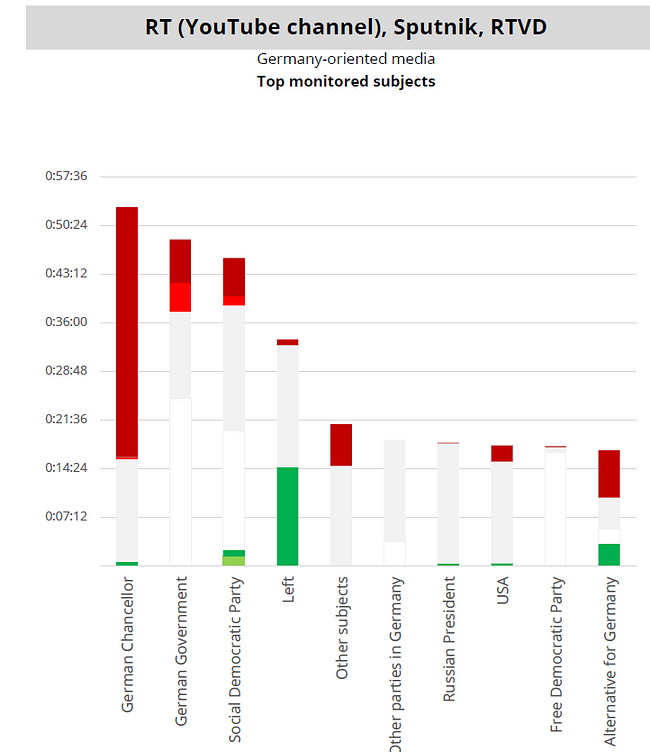
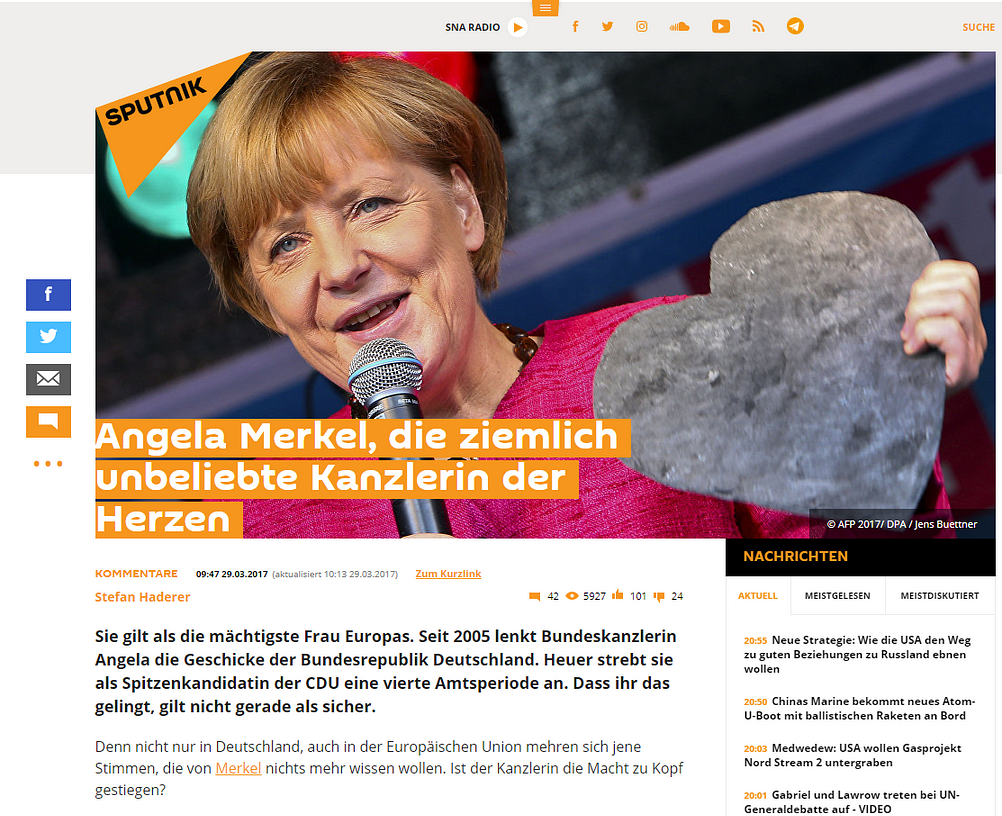
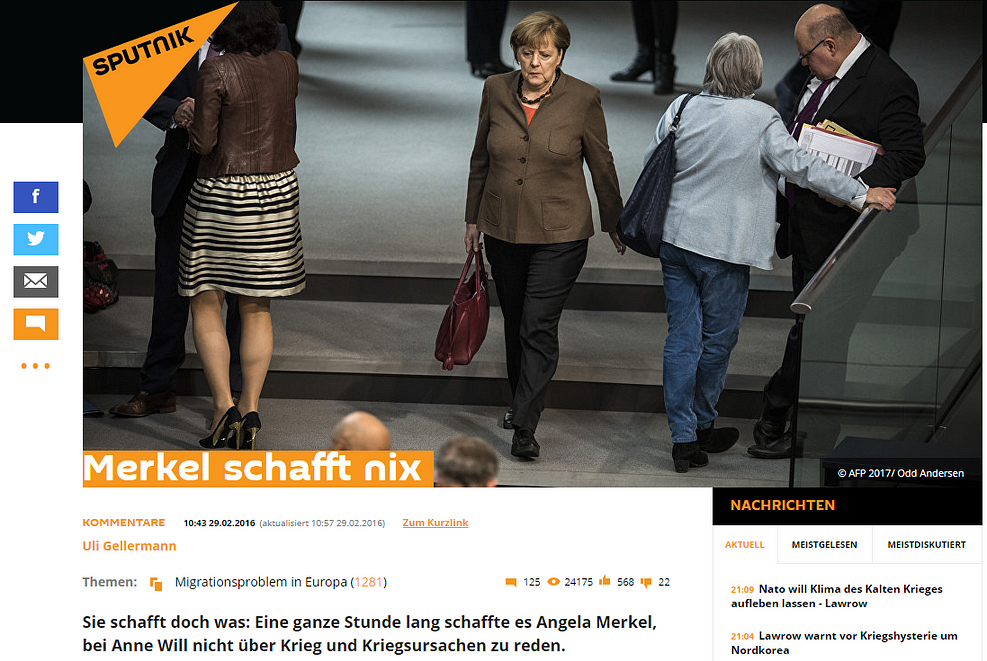
The two examples above (Screenshot 4–5) and the following three examples (Screenshots 6–8) confirm the evaluation by the British scientists. The articles above suggest that Merkel is neither a popular nor successful chancellor. For instance, in its coverage of the electoral campaign, RT Deutsch showed protests of opponents to chancellor Merkel (Screenshot 6), among them many supporters of the AfD and NPD without any comment so that the negative content of the ‘Merkel must go’ campaign was left unchallenged. The AfD furthermore received a lot of space on RT Deutsch as well as at Sputniknews to spread its message to the public (Screenshot 7–8). There are many examples for this biased reporting.⁸⁵ These also included demands for chancellor Merkel to resign.
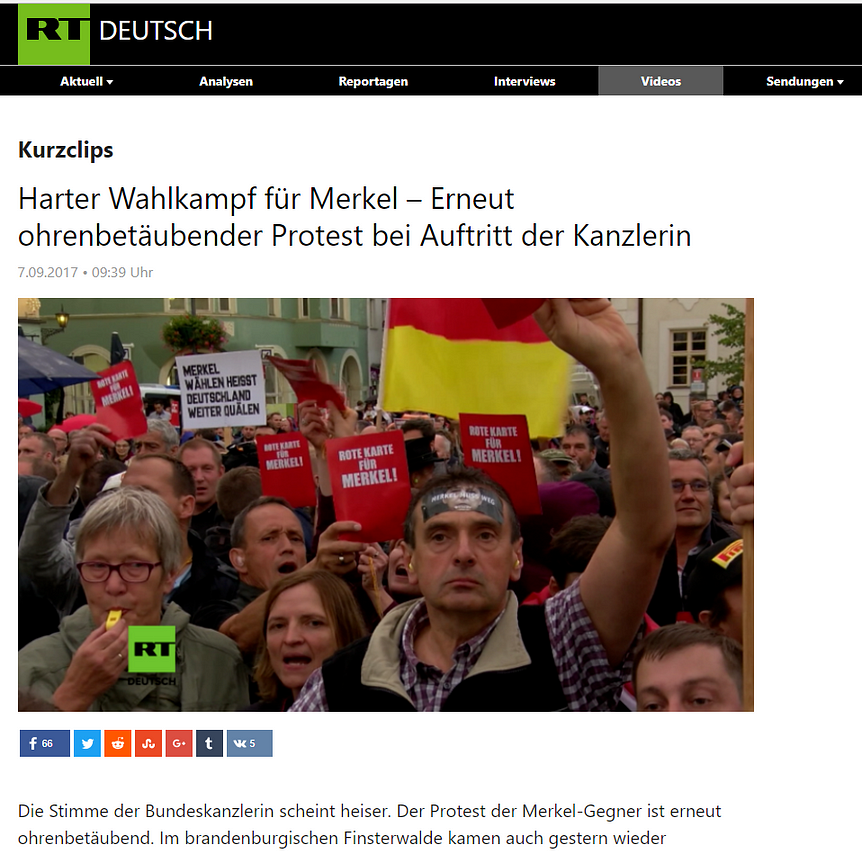
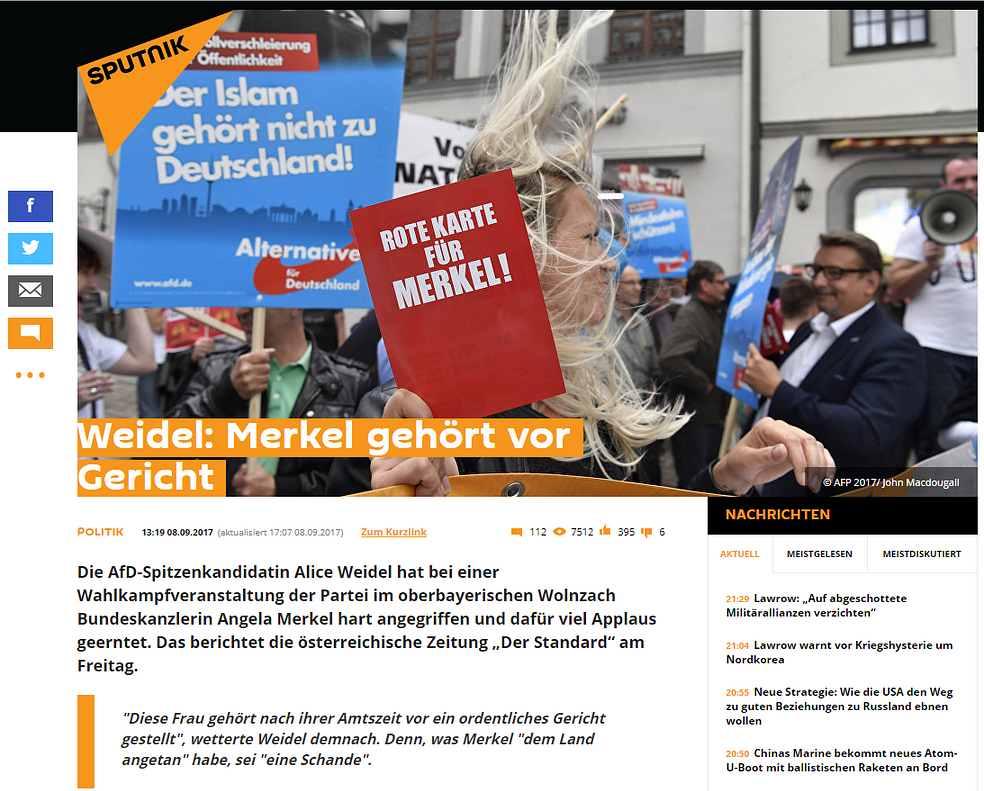
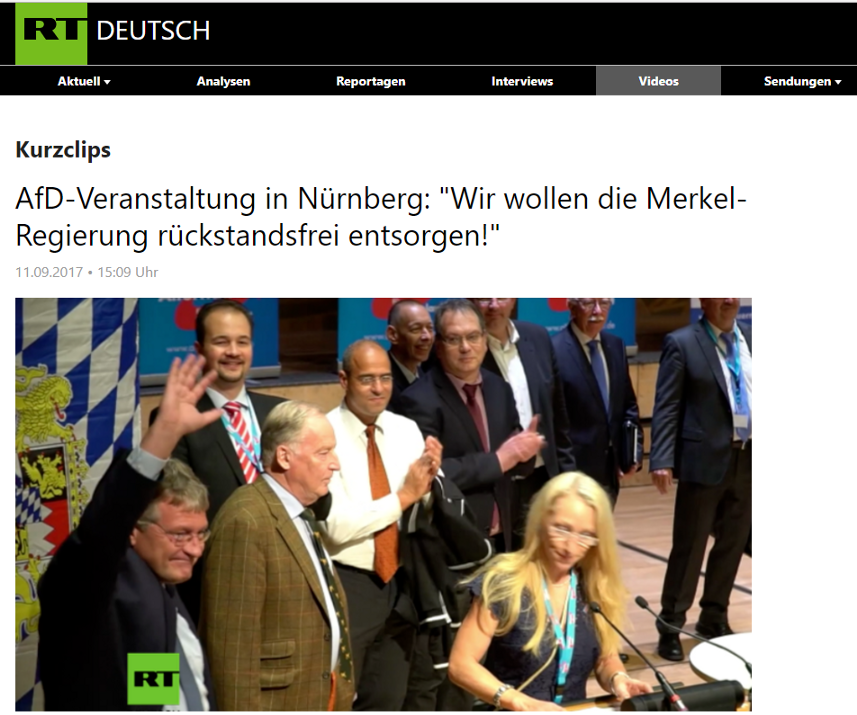
5. How Successful is the Campaign?
Five years have passed since the start of the Sputnik International’s media offensive in Germany, so a preliminary assessment can be made. The label ‘Sputniknews’ has gained some currency, as has SNA radio, the abbreviation for Sputnik News Agency. Like RT, previously Russsia Today, it operates with its abbreviation — an attempt evidently to hide the fact that these media are instruments of the Russian government. SNA radio is gaining ground in the federal states under the name of Mega Radio and at present can be received in Berlin, Brandenburg, Hessia and Bavaria on the Internet or in the digital radio standard DAB +. Mega Radio’s connection to the Russian government, like that of Ruptly TV and its social media offerings Redfish and In the Now, cannot be recognized by looking at their websites. For that reason, several German politicians and other public figures have given interviews without being aware that they were talking to tools of the Russian government.⁸⁹
RT is trying to cooperate with German television stations but thus far such attempts have only been successful in the state of Thuringia. At times, the local station Salve TV broadcasts RT Deutsch’s programme The Missing Part, reaching 120,000 households on cable. The representatives of Russian state media, however, are able to reach a larger audience in Germany due to their appearance on popular talk shows where they frequently portray themselves as independent journalists.
The number of users suggests that Sputniknews is less successful than RT Deutsch. The latter, however, has developed dynamically, even though its number of users is not at the level of that of Deutsche Welle, with which it likes to compare itself. In contrast, Ruptly’s social media channels Redfish and In the Now have been well received by the audience. In fact, in terms of volume of viewers the provider of the latter has even surpassed well established German media.
On 5 April 2019, Sputniknews had 208,420 Followers on Facebook (see Graph 4). More significant than Sputnik is RT Deutsch’s presence on social media. On 5 April 2019, it had nearly 410,000 Followers on Facebook, which is eight times more than when the website was launched at the end of 2014.
The RT programme Der fehlende Part (The Missing Part), however, was less successful. At first, it was broadcast daily, Monday to Friday. Since February 2016, however, the program was shown only once a week and then was discontinued at the end of the year. In March 2017, it came back online with Jasmin Kosubek as a host but in a shortened version.
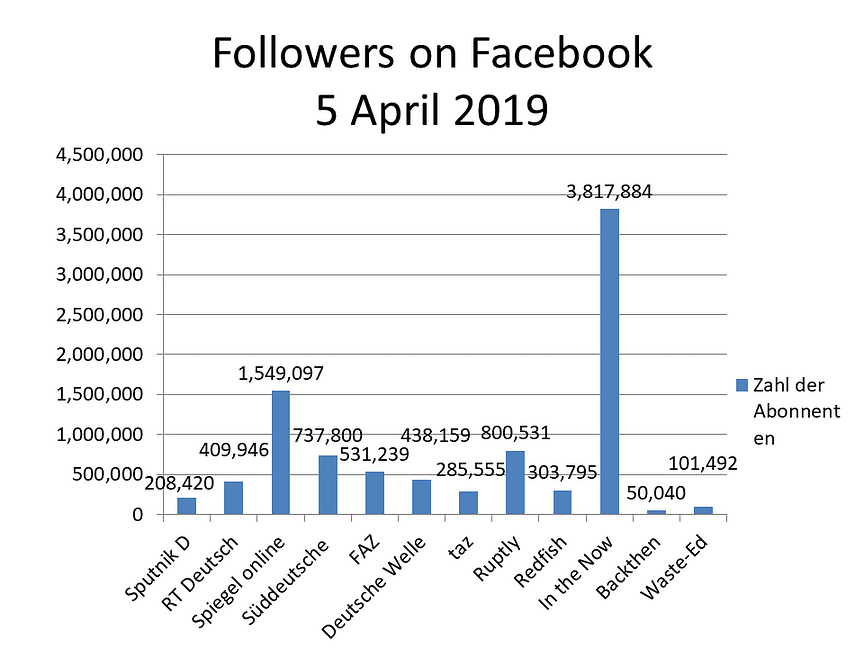
6. Conclusion
The winning concept of the Russian media in Germany is to present the official Russian foreign policy line as an ‘alternative opinion’ and to market themselves as ‘independent’ sources. They blur their connections by abbreviations, such as RT and SNA, or by nondescript names such Mega Radio, Ruptly TV, Redfish and In the Now. Similarly, representatives of Russian state media such as RT Deutsch editor-in-chief Ivan Rodionov and former Rossiya Segodnya bureau chief Dmitry Tulchinskiy appear on talk shows on German television and pretend to be bona fide journalists.
The Russian media in Germany, however, are not independent. They are funded by the Russian government and work closely with headquarters in Moscow. In the case of Sputnik Deutschland, as stated by Rossiya Segodnya’s Andrey Ivanovsky, at least 90 percent of the content is provided directly from Russia. The coverage of international political subject matter in Russia itself in turn is directly controlled by the Kremlin, as former editors of the television channels RT and Rossiya have confirmed.⁹⁰ To that extent, RT Deutsch and Sputniknews do not represent an ‘alternative’ opinion, but the Russian government’s narrative.
Furthermore, RT Deutsch and Sputniknews do not provide serious information in the sense that assertions would be supported by documentation, different viewpoints examined and allegations verified. The reports provide a narrow and biased selection of information. Facts that do not correspond to the Russian narrative are omitted or manipulated. Anyone who wants to find out more about current misrepresentations in the coverage of the Russian media can, for example, consult the website Stop Fake, which appears in German and Russian and in English.⁹¹ One of its principles is ‘always to try to establish the origin of the message or at least to determine its background’.⁹²
One of the Russian media’s most prominent themes is Ukraine. In complete disregard of the facts and precepts of international law, they depict Ukraine as not a state in the real sense of the word, but as an entity possessing ‘non-viable structures’. They create an enemy image of rampant nationalism in that country in order to justify Russia’s military intervention and to discredit Ukraine internationally.
Concerning the coverage of Germany, this too is all about discrediting perceived opponents of the Kremlin and its domestic and foreign policies. The labels that are attached to them are those of ‘cold warrior’, ‘russophobe’ and, based on identification of president Putin with the Russia, as ‘anti-Russian’. The reporting, furthermore, is set in stark friend-foe colours. Oppositional or critical voices from inside Russia fail to appear in RT Deutsch’s and Sputniknews’ coverage. Instead, they cleverly draw on existing doubts in German society and instrumentalise them for Russian foreign policy goals. The image they construct is entirely negative. Democracy in Germany is alleged to be deficient; the government to be a puppet of the United States and on a war course against Russia; and the ‘mainstream media’ to be manipulated. Germany’s friends and allies are also portrayed in a negative light. The EU is presented as doomed in the face of the euro and migrant crises, and NATO is depicted as a warmonger, allegedly threatening Russia.
The treatment of chancellor Merkel by RT Deutsch and Sputniknews demonstrates in exemplary fashion how political opponents of Putin in Germany are discredited and denigrated. At the same time, they provide a platform for the domestic political opposition in the country, in particular the right-wing populist party Alternative für Deutschland and the leftist Die Linke. Political leaders and experts in opposition to the German government and its partners in Europe and the United States are liberally quoted. As shown by a study by the Atlantic Council of the Twitter communities of RT Deutsch and Sputnik, the content of the Russian state media is distributed mainly by supporters of the Russian government and forces of the right of the political spectrum, especially the AfD.⁹³ The Russian media try to exploit freedom of the press in Germany for their own political goals. Reporting is biased and in no way independent or ‘alternative’, as the Russian media are keen to present themselves. At the same time, they are pushing controversial issues such as migration in order to split society. This kind of reporting aims to spread hate against migrants and provoke further protests against the government, especially among Russian speakers in Germany. In the run-up to the federal elections, the Russian media interfered by stigmatising their political enemies and supporting extremist parties. Here it became particularly evident, that Russian media abroad are an important weapon in Russian information warfare.
About the Author
Susanne Spahn (PhD) is a political scientist, historian and journalist based in Berlin. She completed her M.A. degree in East European history, Slavonic studies and political science in St. Petersburg and Cologne In 2011, she received her doctoral degree with a thesis, published as a book, on Staatliche Unabhängigkeit — das Ende der ostslawischen Gemeinschaft? Die Außenpolitik Russlands gegenüber der Ukraine und Belarus seit 1991. Hamburg 2011(State Independence: The End of the East Slavonic Unity? Russia’s Foreign Policy towards Ukraine and Belarus Since 1991). In 2010 and 2011, working in Moscow, she was a contributor to Dow Jones News, Die Welt, Deutsche Welle, Zeit online and Magazin Außenwirtschaft. Her research interests are Russia’s foreign policy in the post-Soviet area and Russian information policy. Spahn’s most recent works include research reports on Das Ukraine-Bild in Deutschland: Wie Russland die deutsche Öffentlichkeit beeinflusst [Ukraine’s Image in Germany: How Russia Influences German Public Opinion] (Hamburg: Verlag Dr. Kovač, 2016), and Russische Medien in Deutschland: Unabhängiger Journalismus oder politisches Instrument? [The „Russian Media in Germany: Independent Journalism or Political Instrument?] (Potsdam: Friedrich Naumann Stiftung, March 2018), in Russian: Российские медиа в Германии. Независимая журналистика или политический инструмент? (Potsdam: Friedrich Naumann Stiftung, March 2018).
The views expressed here do not necessarily represent the views of the Integrity Initiative.
¹ See Anna Amelina, Propaganda oder Autonomie? Das russische Fernsehen von 1970 bis heute (Bielefeld: Bielefeld University, 2006); Nikolaj Petrov, ‘Legitimität, Repression, Kollaps. Die Entwicklungsstadien des Putin-Regimes’, Osteuropa, №8 (2014), pp. 85–98, esp. 88–96.
² Stephen Hutchings and Natalia Rulyova, Television and Culture in Putin`s Russia (Abingdon, Oxon: Taylor and Francis, 2009), pp. 51–56, 213.
³ As quoted by Claudia von Salzen, ‘RT Deutsch, Stimmungsmacher für Wladimir Putin’, Tagesspiegel.de, 22 December2014, http://www.tagesspiegel.de/themen/agenda/rt-deutsch-stimmungsmacher-fuer-wladimir-putin/11154620.html.
⁴ МИА ‘Россия сегодня’ презентовало новый мультимединый бренд Спутник’, RIA.ru, 10 November 2014, http://ria.ru/news_company/20141110/1032604556.html.
⁵ ‘Концепция внешней политики Российской Федерации’, MID.ru, 12 December 2013, http://www.mid.ru/foreign_policy/official_documents/-/asset_publisher/CptICkB6BZ29/content/id/122186.
⁶ ‘Глаголом жечь’, Lenta.ru, 9 December 2013, https://lenta.ru/articles/2013/12/09/ria/.
⁷ In an interview with the newspaper Rossiyskaya gazeta , Rg.ru, 15 October 2014, http://www.rg.ru/2014/10/15/patrushev.html.
⁸ Patrushev, ibid., and Putin in his speech to the federal assembly, ‘Послание Президента Федеральному Собранию’, Kremlin.ru, 4 December 2013, http://www.kremlin.ru/events/president/news/47173.
⁹ ‘Ценность науки в предвидении’, Vpk.news.ru, 27 February 2013, https://vpk-news.ru/sites/default/files/pdf/VPK_08_476.pdf?fbclid=IwAR2t4zbfYXAaD6-VUV-Kt61xiGz8oJV7RIgQiNNwZomg58LGo01bcf-9qP4.
¹⁰ As quoted by Reporters without Borders, ‘Der Kreml auf allen Kanälen. Wie der russische Staat das Fernsehen lenkt’, Berlin 2013, https://www.reporter-ohne-grenzen.de/fileadmin/images/Kampagnen/Sotschi/ROG-Russland-Bericht-2013_web.pdf.
¹¹ ‘Глаголом жечь’ [fn,6].
¹²‘Россия сегодня’ вошла в список стратегических предприятий РФ, BFM.ru, 6 March 2014, http://www.bfm.ru/news/249756.
¹³ ‘Über uns’, https://de.Sputniknews.com/docs/about/ueber_uns.html.
¹⁴ ‘About us’, https://ruptly.tv/about-us.
¹⁵ Елена Бугайская, Russia Today попал в пятерку популярнейших новостных каналов в США RG.ru, 4 March 2016, https://rg.ru/2016/03/04/issledovanie-ezhednevno-rt-smotriat-35-millionov-zritelej-po-vsemu-miru.html. The article states that ‘RT has a TV audience of 70 million weekly viewers in 38 countries’.
¹⁶ ‘Политика АНО “ТВ-Новости” в отношении обработки персональных данных’, Rt.com [no date], https://russian.rt.com/privacy.
¹⁷ Jürg Vollmer, ‘Putin streicht seinem Propandanetzwerk 50 Prozent des gesamten Budgets’, Watson.ch, 26 Januar 2015, https://www.watson.ch/International/Wirtschaft/152122649-Putin-streicht-seinem-Propaganda-Netzwerk-50-Prozent-des-gesamten-Budgets.
¹⁸ ‘Государство сэкономит на собственных СМИ’, Vedomosti.ru, 12 October 2016, http://www.vedomosti.ru/technology/articles/2016/10/12/660699-gosudarstvo-sekonomit-smi.
¹⁹ ‘Бюджет на покорение Франции. RT получит 1,2 млрд руб. на запуск канала на французском языке’, RBC.ru, 7 December 2016, http://www.rbc.ru/newspaper/2016/12/08/5847f7299a7947675da1df8b; and ‘Симоньян о запуске RT France: теперь мы можем доносить до Франции другую картинку мира’, 18 December 2017, https://russian.rt.com/world/news/462027-simonyan-zapusk-rt-france.
²⁰ ‘Симоньян о запуске RT France: теперь мы можем доносить до Франции другую картинку мира’, Vedomosti.ru, 12 October 2016, http://www.vedomosti.ru/technology/articles/2016/10/12/660699-gosudarstvo-sekonomit-smi.
²¹ Timo Niemeier, ‘Deutsche Welle: Deutlich mehr Geld in 2017’, DWDL.de, 28 November 2016, http://www.dwdl.de/nachrichten/58937/deutsche_welle_deutlich_mehr_geld_in_2017/.
²² ‘СМИ и бюджет: деньги закончатся вместе с футболом’, Gazeta.ru, 29 March 2018, https://www.gazeta.ru/business/2018/03/28/11699354.shtml?updated.
²³ ‘CDU/CSU-Fraktion im Bundestag: Mehr Geld für die Deutsche Welle‘, Press Release, 4 July 2018, https://www.cducsu.de/presse/pressemitteilungen/mehr-geld-fuer-die-deutsche-welle.
²⁴ Janis Berzins, ‘Russian New Generation Warfare: Implications for Europe’. Europeanleadershipnetwork.org, 14 October 2014, http://www.europeanleadershipnetwork.org/russian-new-generation-warfare-implications-for-europe_2006.html.
²⁵ ‘Über uns’. RT Deutsch — Wer sind wir?, https://deutsch.rt.com/uber-uns/.
²⁶ ‘Über uns’, https://de.Sputniknews.com/docs/about/ueber_uns.html.
²⁷ Interview with the editor-in-chief of RT Deutsch, Ivan Rodionov, conducted by the online journal Telepolis, Heise.de, 24 November 2014, https://www.heise.de/tp/features/Wir-wurden-gleich-mit-der-Propaganda-Keule-begruesst-3368598.html?seite=all, and interviev with the head of Rossiya Segodnya, Andrey Ivanovsky, with the Medien Labor of the Freie Universität Berlin, http://userpage.fu-berlin.de/melab/wordpress/?p=7590.
²⁸ Facebook page of RT Deutsch, https://www.facebook.com/rtdeutsch/.
²⁹ Interview, editor-in-chief of Ruptly, Ivan Rodionov, with Forum Medien und Entwicklung, 26 November 2013, as quoted by Susanne Spahn, Das Ukraine-Bild in Deutschland: Die Rolle der russischen Medien. Wie Russland die deutsche Öffentlichkeit beeinflusst (Kovač Verlag: Hamburg, 2016), p. 19.
³⁰ Jasmin Kosubek, ‘Xing’ profile, https://www.xing.com/profile/Jasmin_Kosubek.
³¹ ‘Extra’ broadcast of RTL, 28 August 2017.
³² Ibid.
³³ ‘Ruptly’, http://de.wikipedia.org/wiki/Ruptly.
³⁴ Ruptly TV website, https://ruptly.tv/impressum.
³⁵ Jan-Henrik Wiebe, ‘Russlands heimliche Medienzentrale in Europa: Mitten in Berlin’, T-online.de, 16 November 2018, https://www.t-online.de/nachrichten/deutschland/gesellschaft/id_84584050/mitten-in-berlin-russlands-heimliche-medienzentrale-in-europa.html.
³⁶ Redfish, ‘About us’, https://redfish.media/about-us/ and Redfish, https://redfish.media/.
³⁷ ‘RT goes undercover as “In the Now”’, EUvsdisinfo.eu, 22 May 2017, https://euvsdisinfo.eu/rt-goes-undercover-as-in-the-now/.
³⁸ Backthen on Facebook, https://www.facebook.com/GoBackthen/.
³⁹ Waste-Ed on Facebook, https://www.facebook.com/GoWasteEd/.
⁴⁰ RIA Novosti, http://de.wikipedia.org/wiki/RIA_Novosti.
⁴¹ ‘Stimme Russlands’, http://de.wikipedia.org/wiki/Stimme_Russlands
⁴² Sputnik.news, https://de.Sputniknews.com/popup/radio/.
⁴³ See Tulchinskiy’s biographic data in Spahn, Das Ukraine-Bild in Deutschland [fn. 29], p. 21.
⁴⁴ Andrey Ivanovskiy, ‘Autoren Profil’, Profil.at [no date], https://www.profil.at/autoren/andrej-iwanowski, and id., ‘Aufstand gegen das “Sotschi-Bashing”’, Sankt Petersburger Herold, 17 Debruary 2014, http://www.spzeitung.ru/aktuell/kommentar-aufstand-gegen-das-sotschi-bashing.html.
⁴⁵ Ivanovskiy interview, ‘Objektiven Journalismus gibt es nicht’, Freie Universität Berlin, Medien Labor, FU-berlin.de [no date], http://userpage.fu-berlin.de/melab/wordpress/?p=7590.
⁴⁶ Ibid.
⁴⁷ Armin Siebert, ‘Sputnik macht Propaganda, Sputniknews’, 19 June 2017, https://de.Sputniknews.com/kommentare/20170619316230671-Sputnik-macht-propaganda/.
⁴⁸ Jens Rosbach, ‘Putins geheime Online-Armee’, Deutschlandfunk.de, 22 May 2014, http://www.deutschlandfunk.de/ukraine-konflikt-putins-geheime-online-armee.1781.de.html?dram:article_id=287018.
⁴⁹ ‘Столица политическая троллинга’, Moy rayon, Mr7ru, 11 March 2015, http://mr7.ru/articles/112478/.
⁵⁰ Ibid.
⁵¹ Ibid.
⁵² Daria Sukharchuk, ‘Russland: Propaganda aus der Trollfabrik’, Zeit.de, 9 July 2015, http://www.zeit.de/politik/ausland/2015-07/russland-trolle-enthuellung.
⁵³ ‘Troll-Armee’, Wikipedia, https://de.wikipedia.org/wiki/Troll-Armee.
⁵⁴ The originals of the ‘technical instructions’ are available at the website of Moy rayon; see ‘Столица политическая троллинга’ [Fn. 49].
⁵⁵ Ibid.
⁵⁶ Ibid.
⁵⁷ Sukharchuk [fn. 52] and Interview with Ludmila Savchuk with Deutsche Welle, 8.8.2015, http://www.dw.com/de/sawtschuk-putins-internet-trolle-ohne-grenzen/a-18631803
⁵⁸ Adrian Chen, ‘The Agency’, Nytimes.com, 2 June 2015, http://www.nytimes.com/2015/06/07/magazine/the-agency.html?_r=0.
⁵⁹ ‘Trollfabrik — Propagandastelle des Kremls muss zahlen’, Welt.de, 18 August 2015, http://www.welt.de/politik/ausland/article145324382/Trollfabrik-Propagandastelle-des-Kremls-muss-zahlen.html.
⁶⁰ Chen, ‘The Agency’ [Fn. 58].
⁶¹ Angela Gruber et al. ‘Twitter veröffentlicht Propaganda-Archiv. So arbeiten russische Internet-Trolle’, Spiegel.se, 18 October 2018, http://www.spiegel.de/forum/netzwelt/twitter-veroeffentlicht-propaganda-archiv-so-arbeiten-russische-internet-trolle-thread-816103-1.html.
⁶² Putin Interview with German television ARD, 16 November 2014, https://www.youtube.com/watch?v=nGSk-qPcJzY.
⁶³ ‘Russophobie als Exportware: “Kiewer Führung wurde von europäischen Ländern etabliert”’, Sputniknews.com, 10 July 2017, https://de.Sputniknews.com/politik/20170710316528613-russophobie-exportware-kiew-fuehrung-europa/.
⁶⁴ ‘Putin admits Russian military presence in Ukraine for first time’, Theguardian.com, 17 December 2015, https://www.theguardian.com/world/2015/dec/17/vladimir-putin-admits-russian-military-presence-ukraine.
⁶⁵ ‘Neues NATO-Spiel in der Ukraine: Ich sehe was, was du nicht siehst’, Rtdeutsch.com, 12 November 2014, http://www.rtdeutsch.com/6068/international/neues-nato-spiel-in-der-ukraine-ich-sehe-was-was-du-nicht-siehst/.
⁶⁶ Verbatim she was asked: ‘Is the UN in the position to independently verify these reports?’ Briefing by UN spokeswoman Stephane Dujarric, 7 November 2014, http://www.un.org/press/en/2014/db141107.doc.htm.
⁶⁷ ‘Amnesty International: Blockierte Hilfskonvois — Katastrophe für die Ost-Ukraine’, Sputniknews.com, 24 December 2014, https://de.sputniknews.com/ausland/20141224300355362/.
⁶⁸ Amnesty.org, 23 December 2014, http://www.amnesty.org/en/news/eastern-ukraine-humanitarian-disaster-looms-food-aid-blocked-2014-12-23.
⁶⁹ Enno Park, ‘Perfider Trick aus der Mottenkiste der Rhetorik’, Deutschlandfunkkultur.de, 27 April 2017, http://www.deutschlandfunkkultur.de/und-was-ist-mit-perfider-trick-aus-der-mottenkiste-der.1005.de.html?dram:article_id=384660.
⁷⁰ ‘Der Fall Lisa — Die hartnäckigste Fake News über RT Deutsch’, Deutsch.rt.com, 6 December 2016, https://deutsch.rt.com/gesellschaft/43975-fall-lisa-hartnackigste-fake-news/.
⁷¹ ‘Lawrow will nichts mehr vom Fall Lisa wissen’, N-tv.de, 29 Janaury 2016, http://www.n-tv.de/politik/Lawrow-will-nichts-mehr-vom-Fall-Lisa-wissen-article16890791.html.
⁷² ‘Der Fall Lisa‘ [fn. 70].
⁷³ ‘Der Fall Lisa: Politisierung eines Sexualverbrechens’, Deutsch.rt.com, 28 January 2016, https://deutsch.rt.com/inland/36526-fall-lisa-politisierung-sexualverbrechens/.
⁷⁴ Ibid.
⁷⁵ Ibid. Blagoy evidently referred here to the 2015 New Year’s celebrations in Cologne which got out of hand with groups of people committing offenses, including sexual offenses. The interior ministry later confirmed that 31 suspects were identified by name, two-thirds of them asylum seekers. These included nine Algerians, eight Moroccans, four Syrians, five Iranians and an Iraqi; see ‘2015–16 New Year’s Eve sexual assaults in Germany’, https://en.wikipedia.org/wiki/2015%E2%80%9316_New_Year%27s_Eve_sexual_assaults_in_Germany#Cologne.
⁷⁶ ‘Anklage im Fall Lisa erhoben’, T-online.de, based on DPA, 28 February 2017, http://www.t-online.de/nachrichten/panorama/justiz/id_80494724/berlin-anklage-im-fall-lisa-erhoben.html.
⁷⁷ ‘Fall Lisa: Staatsanwaltschaft erhebt Anklage wegen “schweren sexuellen Missbrauchs”’, RT Deutsch, 28.2.2017, https://deutsch.rt.com/inland/47059-fall-lisa-nun-ermittelt-staatsanwaltschaft/.
⁷⁸ As reported by RT Deutsch, ‘Russischer Star-Moderator: “Merkel ist aus der Mode gekommen” − Springerpresse tobt’, Deutsch.rt.com, 3 February 2017, https://deutsch.rt.com/europa/46056-bild-russische-merkel-kritik/.
⁷⁹ ‘Protestler in Halle begrüßen Bundeskanzlerin mit “Heil Merkel”-Ausruf’, RT Deutsch, 23.3.2017, https://deutsch.rt.com/newsticker/48093-heil-merkel-grusse-aus-halle/.
⁸⁰ ‘Protestler in Halle begrüßen Bundeskanzlerin mit “Heil Merkel”-Ausruf’, RT Deutsch, 23.3.2017, https://deutsch.rt.com/newsticker/48093-heil-merkel-grusse-aus-halle/.
⁸¹ http://www.isdglobal.org/wp-content/uploads/2017/12/Make-Germany-Great-Again-ENG-081217.pdf, p. 12
⁸² Reproduced by permission of the Institute for Strategic Dialogue and the Institute for Global Affairs (ed.), Make Germany great again: Der Kreml, die Alt-Right und die internationale Einflussnahme auf die Bundestagswahlen 2017. (ISD) London 2017, http://www.isdglobal.org/wp-content/uploads/2017/12/Make-Germany-Great-Again-DE-131217.pdf. The appendix contains a special report on the state of Thuringia: http://www.isdglobal.org/wp-content/uploads/2017/12/Make-Germany-Great-Again-Addendum.pdf.
⁸³ ‘Merkel, die ziemlich unbeliebte Kanzlerin der Herzen’, Sputniknews, 29 March 2017, https://de.Sputniknews.com/kommentare/20170329315081652-angela-merkel-unbeliebte-kanzlerin/.
⁸⁴ ‘Merkel schafft nix’, Sputniknews, 29 February 2016, https://de.sputniknews.com/kommentare/20160229308141343-merkel-schafft-nix/
⁸⁵ ‘Neue repräsentative Umfrage: 40 Prozent der Bundesbürger fordern Rücktritt von Merkel’, Deutsch.rt.com, 29 January 2016, https://deutsch.rt.com/inland/36545-neue-reprasentative-umfrage-40-prozent/; and ‘Willy Wimmer attackiert Bundesregierung: “Die Zeit des Rücktritts ist überfällig”’, Deutsch.rt.com, 4 August 2016, https://deutsch.rt.com/inland/39802-willy-wimmer-attackiert-bundesregierung-/.
⁸⁶ ‘Harter Wahlkampf für Merkel, Rt.com’, 7 September 2017, https://deutsch.rt.com/kurzclips/56911-harter-wahlkampf-merkel-brandenburg/.
⁸⁷ ‘Weidel: Merkel gehört vor Gericht’, Sputniknews.com, 8 September 2017, https://de.sputniknews.com/politik/20170908317358996-weidel-merkel-gericht/.
⁸⁸ ‘AfD-Veranstaltung in Nürnberg’, RT Deutsch, 11 September 2017, https://deutsch.rt.com/kurzclips/57110-afd-merkel-regierung-entsorgen/.
⁸⁹ See, for instance, the reports by Jan-Henrik Wiebe, ‘Russlands heimliche Medienzentrale in Europa: Mitten in Berlin’, https://www.t-online.de/nachrichten/deutschland/gesellschaft/id_84584050/mitten-in-berlin-russlands-heimliche-medienzentrale-in-europa.html, T-online.de, 16 November 2018, and Markus Wehner, ‘Des Kremls neue Medien’, Frankfurter Allgemeine Zeitung, 23 January 2019, p. 10.
⁹⁰ ‘Исповедь пропагандиста. Часть I. Как делают новости на государственном ТВ’, The Insider, 9 June 2017, http://theins.ru/confession/59757.
⁹¹ Stop Fake, http://www.stopfake.org/de/start/.
⁹² ‘Wie identifiziere ich ein Fake?’, Stop Fake, http://www.stopfake.org/de/wie-identifiziere-ich-ein-fake/, and https://www.stopfake.org/en/how-to-identity-a-fake/.
⁹³‘Digital Forensic Research Lab: The Kremlin’s amplifiers in Germany’, Medium.com, 22 June 2017, https://medium.com/dfrlab/the-kremlins-amplifiers-in-germany-da62a836aa83.


